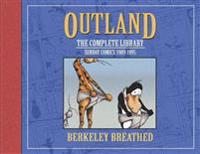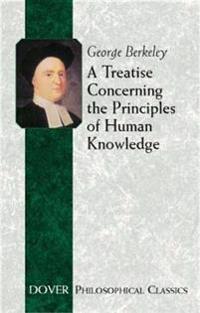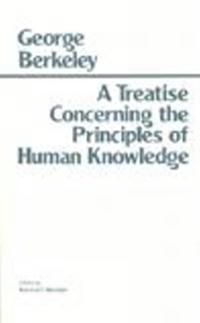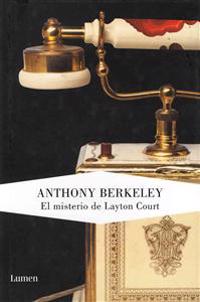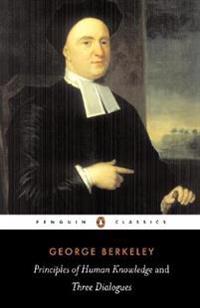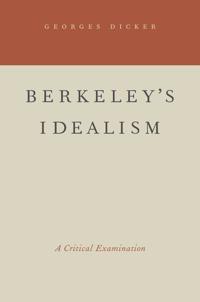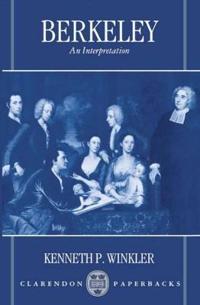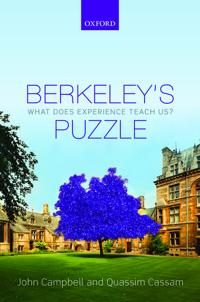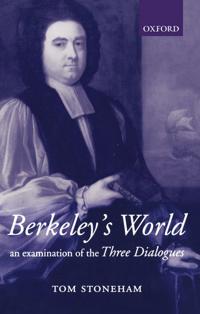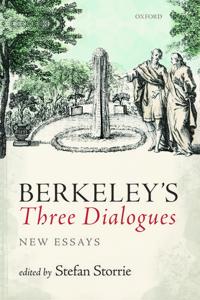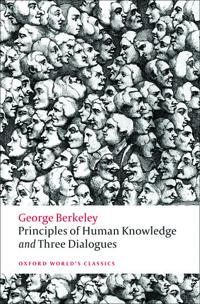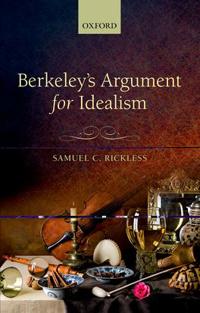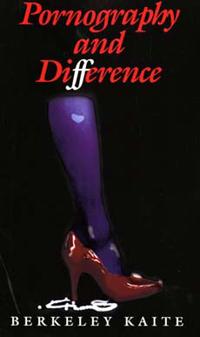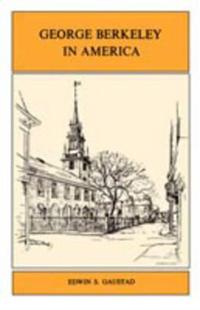George Berkeley (Pocket)
avGeorge Berkeley, Michael B. (EDT) Mathias, Daniel (EDT) Kolak
ISBN: 9780321276131 - UTGIVEN: 2006-12Part of the "Longman Library of Primary Sources in Philosophy," this edition of Berkeley's Three Dialogues Between Hylas and Philonous is framed by a pedagogical structure designed to make this important work of philosophy more accessible and meaningful for readers. A General Introduction includes b[...]
An Essay Towards a New Theory of Vision. by George Berkeley, ... the Second Edition. (Häftad)
avGeorge Berkeley
ISBN: 9781170038611 - UTGIVEN: 2010-06Berkeley Breathed's Outland: The Complete Collection (Inbunden)
avBerkeley Breathed
ISBN: 9781613771761 - UTGIVEN: 201207Berkeley Breathed, the mad genius who boggled and bewildered us with Bloom County, is back! Soon after retiring Bloom County - and at the peak of its popularity - Breathed returned with an all-new Sunday-only newspaper strip: Outland. Debuting just four weeks after the final Bloom County was publish[...]
Berkeleyworks: The Art of Berkeley Breathed (Inbunden)
avBerkeley Breathed
ISBN: 9781613776513 - UTGIVEN: 2013-09Berkeley Breathed is the award-winning cartoonist best known for his immensely popular Bloom County newspaper comic strip, as well as two follow-ups, Outland and Opus. But if you think Berkeley Breathed is only about a fanciful penguin and his whimsical cohorts, then you have another think coming! B[...]
A Treatise Concerning the Principles of Human Knowledge (Pocket)
avGeorge Berkeley, Thomas J. McCormack, George Berkeley
ISBN: 9780486432533 - UTGIVEN: 2003-11A Treatise Concerning the Principles of Human Knowledge (Inbunden)
avGeorge Berkeley, Kenneth P. Winkler, George Berkeley
ISBN: 9780915145409 - UTGIVEN: 198301El misterio de Layton Court / Tthe Layton Court Mystery (Inbunden)
avAnthony Berkeley, Miguel Temprano (TRN) Garcia, Anthony Berkeley
ISBN: 9788426417787 - UTGIVEN: 2010-09Principles of Human Knowledge and Three Dialogues Between Hylas and Philonous (Pocket)
avGeorge Berkeley
ISBN: 9780140432930 - UTGIVEN: 1988-06One of the greatest British philosophers, Bishop Berkeley (1685 1753) was the founder of the influential doctrine of Immaterialism the belief that there is no reality outside the mind, and that the existence of material objects depends upon their being perceived. The Principles of Human Knowledge el[...]
Berkeley's Idealism (Häftad)
ISBN: 9780195381450 - UTGIVEN: 2011-07In George Berkeley's two most important works, the Principles of Human Knowledge and Three Dialogues Between Hylas and Philonous, he argued that there is no such thing as matter: only minds and ideas exist, and physical things are nothing but collections of ideas. In defense of this idealism, he adv[...]
Berkeley (Häftad)
avKenneth P. Winkler
ISBN: 9780198235095 - UTGIVEN: 199403David Hume wrote that Berkeley's arguments 'admit of no answer but produce no conviction'. This book aims at the kind of understanding of Berkeley's philosophy that comes from seeing how we ourselves might be brought to embrace it. Berkeley held that matter does not exist, and that the sensations we[...]
George Berkeley (Häftad)
avDavid Berman
ISBN: 9780198264675 - UTGIVEN: 1996-05Unlike nearly all studies of Berkeley, this book looks at the full range of his work and links it with his life - focusing in particular on his religious thought. While aiming to present a clear picture of his career, this book breaks new ground on, among other topics, Berkeley's philosophical stra[...]
Berkeley's Puzzle (Inbunden)
avJohn Campbell
ISBN: 9780198716259 - UTGIVEN: 2014-09Sensory experience seems to be the basis of our knowledge and conception of mind-independent things. The puzzle is to understand how that can be: even if the things we experience (apples, tables, trees etc), are mind-independent how does our sensory experience of them enable us to conceive of them a[...]
Berkeley's World (Häftad)
avTom Stoneham
ISBN: 9780198752370 - UTGIVEN: 200210Tom Stoneham offers a clear and detailed study of Berkeley's metaphysics and epistemology, as presented in his classic work Three Dialogues between Hylas and Philonous, originally published in 1713 and still widely studied today. Stoneham writes for advanced undergraduates, graduate students, and ac[...]
Berkeley's Three Dialogues
ISBN: 9780198755685 - UTGIVEN: 2018-03This is the first volume of essays devoted to Berkeley's Three Dialogues between Hylas and Philonous, a classic of early modern philosophy. Leading experts examine all the central issues in Berkeley's work. The Three Dialogues is a dramatization of Berkeley's philosophy in which the two protagonist[...]
Berkeley's Puzzle
ISBN: 9780198777564 - UTGIVEN: 2016-11Sensory experience seems to be the basis of our knowledge and conception of mind-independent things. The puzzle is to understand how that can be: even if the things we experience (apples, tables, trees, etc), are mind-independent how does our sensory experience of them enable us to conceive of them [...]
Language and the Structure of Berkeley's World
ISBN: 9780198790334 - UTGIVEN: 2017-03According to George Berkeley (1685-1753), there is fundamentally nothing in the world but minds and their ideas. Ideas are understood as pure phenomenal 'feels' which are momentarily had by a single perceiver, then vanish. Surprisingly, Berkeley tries to sell this idealistic philosophical system as [...]
Principles of Human Knowledge and Three Dialogues (Häftad)
avGeorge Berkeley
ISBN: 9780199555178 - UTGIVEN: 200902Berkeley's idealism started a revolution in philosophy. As one of the great empiricist thinkers he not only influenced British philosophers from Hume to Russell and the logical positivists in the twentieth century, he also set the scene for the continental idealism of Hegel and even the philosophy o[...]
Berkeley's Argument for Idealism (Inbunden)
avSamuel C. Rickless
ISBN: 9780199669424 - UTGIVEN: 2013-01Samuel C. Rickless presents a novel interpretation of the thought of George Berkeley. In A Treatise Concerning the Principles of Human Knowledge (1710) and Three Dialogues Between Hylas and Philonous (1713), Berkeley argues for the astonishing view that physical objects (such as tables and chairs) a[...]
Berkeley's Idealism
ISBN: 9780199700790 - UTGIVEN: 2011-06Using the tools of contemporary analytic philosophy, Georges Dicker here examines both the destructive and the constructive sides of Berkeley's thought, against the background of the mainstream views that he rejected.[...]
Showstoppers: Busby Berkeley and the Tradition of Spectacle (Inbunden)
avMartin Rubin
ISBN: 9780231080545 - UTGIVEN: 1993-08-05Pornography and Difference (Häftad)
avBerkeley Kaite
ISBN: 9780253209795 - UTGIVEN: 199506The graphic genital display, the come-hither look, the spike-heel shoe, and the pearl necklace, lace and leather, are all enduring features of contemporary "straight" pornography. At first blush, these objects and representations are feminine in their use and their symbolism. They appear marked as ([...]
Words, Thought and Theories (Övrig)
avAlison Gopnik, Andrew N. Meltzoff, Alison Gopnick (Professor Of Psychology, University Of California, Berkeley, USA)
ISBN: 9780262571265 - UTGIVEN: 1998-10-02Words, Thoughts, and Theories articulates and defends the "theory theory" of cognitive and semantic development, the idea that infants and young children, like scientists, learn about the world by forming and revising theories, a view of the origins of knowledge and meaning that has broad implicatio[...]
George Berkeley in America (häftad)
ISBN: 9780300113440 - UTGIVEN: 1979-09In 1728 George Berkeley, the Irish philosopher and Anglican priest, came to America in the hope of founding a university in Bermuda and converting the Indians. He never reached Bermuda, where within a few years no Indians were left. Instead he settled in Newport, Rhode Island, one of the few places [...]



